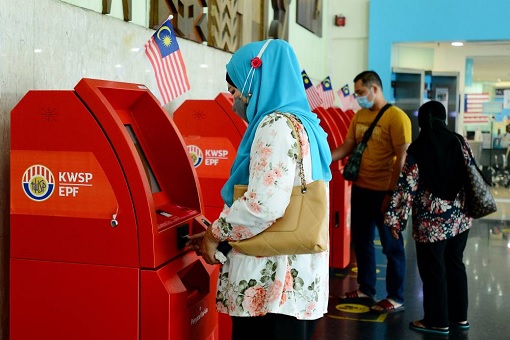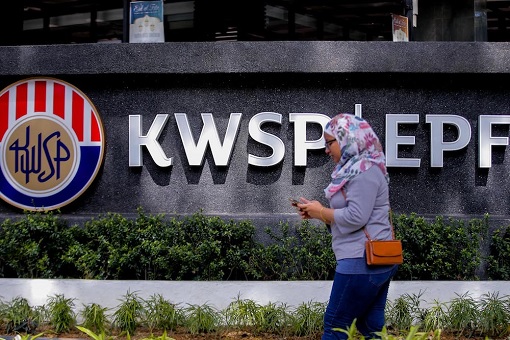Between May 11 and May 22, the Employees Provident Fund (EPF) approved a whopping 3.04 million applications from contributors to withdraw part of their retirement money from Account 3 to the tune of RM5.52 billion. Within the same period, it has received 2.86 million applications to transfer RM8.78 billion from Account 2 (Akaun Sejahtera) to Account 3 (Akaun Fleksibel).
But it was just the beginning. Millions more are expected to transfer to the newly created Account 3 until the deadline on August 31. The restructuring, which saw Account 1 (70%) and Account 2 (30%) redesigned to Account 1 (75%), Account 2 (15%) and Account 3 (10%), will allow EPF’s 16.07 million members to withdraw 10% of their retirement saving “whenever they like”.
While Account 1 (Akaun Persaraan) appears to have been strengthened to 75% from 70%, the effective loss of saving is still 10% as most members will treat Account 3 like an ATM machine. If every EPF member decides to withdraw, the total fund that would be moved to Account Fleksibel will amount to RM57 billion. Because it’s a “one-off” option, majority will opt for the transfer.
Therefore, even if workers don’t plan to withdraw now, they will still transfer one-third of their savings from Account 2 to Account 3 – just in case. After all, this new account still enjoy the same dividend as other accounts. The simple fact that over 3 million applications were approved in just 11 days alone clearly shows the stunning popularity – and desperation – to withdraw from the retirement fund before the maturity of the retirement age.
The EPF or the government might argue that the creation of Account 3 is the best thing since sliced bread, allowing contributors to withdraw funds for emergencies without resorting to avenues such as loan sharks. However, it’s human nature that they don’t have the discipline nor possessed the financial literacy not to misuse the flexibility other than so-called emergency withdrawals.
There’s a reason why the Employees Provident Fund was established in the first place. Founded in 1951, its purpose is to be a social security organisation to provide retirement benefits for private sector and non-pensionable employees in Malaysia. It is a compulsory savings scheme designed to help employees secure their financial future because they don’t have the discipline to save for retirement.
During the previous clueless, incompetent and irresponsible backdoor governments of Mahiaddin Yassin and Ismail Sabri, EPF members were allowed – even encouraged – to withdraw not once, not twice but four times during the Covid-19 pandemic. The four special withdrawals had depleted a total of RM145 billion in retirement savings, affecting mostly M40 and B40 workers.
Amusingly, the backdoor prime ministers shamelessly claimed that the four EPF withdrawals – from i-Lestari to i-Citra – were government financial aid. Even during “i-Lestari” Account 2 Withdrawal Scheme, it was revealed that some EPF members had already exhausted their Account 2 after just two months – that’s only RM1,000. The bottom 10% of EPF members had only an average of RM319 in their Account 2.
Yet, then-backdoor PM Muhyiddin was already studying new suggestions from half-past-six politicians to allow EPF members to withdraw more money from their Account 1 (an account specifically for retirement). Politicians, including former PM Najib Razak (the world’s biggest crook), too had pushed the government to allow people in need of cash to drain their savings cookie jar in EPF.
The Muhyiddin government – cleverly but irresponsibly – opened the floodgate of EPF withdrawals to rescue a sagging economy, which it had no idea how to fix, when the retirement funds should be safeguarded at all cost to ensure retirees have sufficient funds to survive through their golden years. But the treachery government did not care, largely because the people were too hungry for cash.
For the 71% of EPF contributors who had savings of less than RM50,000, let alone the 30% of EPF members who had less than RM5,000 in their retirement accounts, how much money would be left if they are allowed to withdraw up to RM10,000 from their Account 1? Instead of government helping the people, it was the people who had to use their hard-earned savings to help the government.
In the subsequent “i-Sinar” Account 1 Withdrawal Scheme, former Finance Minister Tengku Zafrul Abdul Aziz admitted that 42% of EPF members had less than RM5,000 in Account 1. When EPF contributors were allowed to withdraw up to RM5,000, or RM1,000 a month for five months under i-Citra, a total of RM101 billion would have been disbursed to over 7.4 million members.
Worse, the i-Lestari, i-Sinar, and i-Citra had burned such a big hole in the EPF members’ retirement savings that 6.1 million members were left with less than RM10,000 in their EPF accounts. A total of 3.6 million members have less than RM1,000. It was so bad that EPF was worried that Bumiputera members, the so-called “sons of the soil”, accounted for 78% of the withdrawal applicants.
By end of 2021, a whopping 4.4 million or 54% of Bumiputera members had less than RM10,000, and 2 million (25%) had less than RM1,000 in their EPF account. Thanks to the multiple withdrawals, 73% of members were plunged into a deplorable state – having insufficient funds to retire above the poverty line. Only 27% EPF members could meet the “RM240,000 Basic Savings” at age 55.
The best part was most of those withdrawals were not used to make ends meet, nor to put food on the table. Getting a brand new car, renovating houses, upgrading new iPhone, buying new furniture and bigger TV, purchasing PS4 or Microsoft Xbox game console was how EPF members misused the facilities. That’s why even during Covid lockdown, total vehicle sales skyrocketed to 529,514 (2020) and 508,911 (2021) units.
By end of 2023, about two years later, the issue of insufficient savings in the Employees Provident Fund (EPF) continued. The number of members with less than RM10,000 in their EPF accounts increased to 6.3 million from 6.1 million (end of 2021). Essentially, these workers would have a retirement income of less than RM42 per month for the next 20 years.
So, despite a change of government, the Anwar Madanistan administration too could not resist the temptation of taking the shortcut to popularity. It was only in May 2023 that the 10th Prime Minister declared – and lied – that he will not be pressured to allow more EPF withdrawals. The finance minister said it was the right decision, even though it was unpopular.
However, he made a spectacular U-turn in just a year later, creating a special ATM machine disguised as Account 3 this month – largely because Malays or Bumiputeras have started complaining and comparing between Mahiaddin’s popular move of allowing withdrawals and Anwar’s refusal to allow withdrawals. Desperate to win Malay votes, the PM is helping the Malays to dig a bigger hole to retirement poverty.
Based on the past experience, EPF can bet its last penny that withdrawals would be made to satisfy non-urgent desires such as buying gadgets, decorating houses, buying a car or just to keep up with the latest fashion trends. With Account 3 permanently set up, it is expected that contributors may get addicted to make frequent withdrawals, which EPF itself estimates to be RM5 billion yearly.
Like it or not, it’s an admission that the economy is still in a bad shape, and Prime Minister Anwar, just like his predecessors, is relying on such EPF withdrawals to pump fresh money into the market to boost the economy. The government doesn’t care if the contributors would suffer in the long-term when they retire, nor does it care about inflation triggered by a flood of hot money.
Saddled with RM1.5 trillion national debts, Malaysia is running out of money due to corruption, leakages and excessive religious politics – spooking foreign investors, who have better options in the region such as Singapore, Vietnam, Indonesia or even Cambodia. The government has already begun cutting on fuel subsidy, starting with diesel to be followed with RON-95 petrol later.
To be fair, the extraordinarily long queues in Sabah and Sarawak to withdraw from the new flexible account suggests that thousands of hardcore poor households in the Borneo states would benefit from Account 3. To them, even a minimum withdrawal amount of RM50 could mean a difference between going to bed on an empty stomach or with food. At the same time, however, it also shows the government has done very little to eradicate poverty there.
Nevertheless, with EPF contributors fast draining their own retirement savings, they would need the government’s assistance during the old age due to obvious reason. They would also not be able to support themselves when they suffer a major illness. This could create new crises in the future, which requires the government to spend more money on social security and healthcare. - finance Twitter
The views expressed are those of the writer and do not necessarily reflect those of MMKtT.










No comments:
Post a Comment
Note: Only a member of this blog may post a comment.